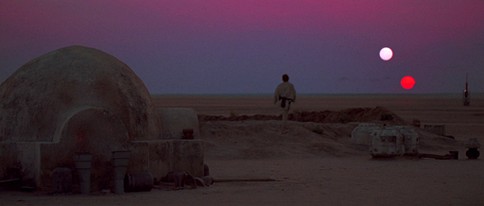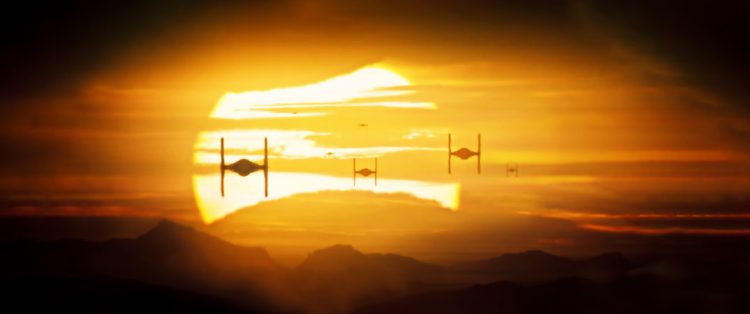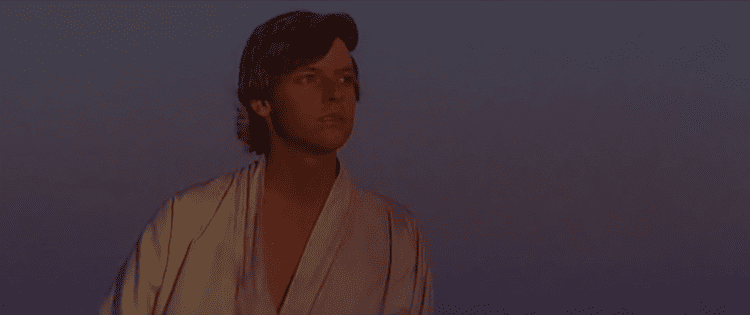When I left the cinema, it was this one shot that stuck in my head more than any other. And there were plenty of beautiful, memorable shots throughout the film – but there’s something about seeing futuristic space fighters against a sunset that really resonates with me, something in that shot that elevated the film above other sci-fi flicks.
I think it’s because it’s evening.
Sci-fi always seems to happen at night. Of course a lot of sci-fi happens in space, where it’s always night time; but sometimes stuff happens in the daytime – and when it does, it’s usually bright and harsh and dusty. But there’s something about evenings that’s extremely important to humans: it’s that calm transition, the moment of calming and changing gears at the end of a day’s work, before heading out on the town (or wherever). There’s a whole cosm of human experience tied into the atmosphere that evenings bring.
And the Star Wars films have always used evenings to their advantage. You can be on a planet at the far edge of the universe, a gazillion miles from home, but if you’re watching a sunset (even multiple suns setting), something primeval kicks in and you suddenly feel: this place ain’t so different. Show me a character looking into a sunset and I instantly know and connect with the atmosphere there. I can feel the temperature dropping, feel the anticipation of night falling – but it hasn’t fallen yet. Relief the day’s work is over; expectation of what the night will bring.

And day and night are such broad textures to paint your scenes with that they don’t really tell you anything much about the time. An EXT. DAY shot doesn’t tell you whether it’s morning or afternoon without adding lots of other visual or scripted cues. Likewise an EXT. NIGHT – it could be 10 at night or it could be 4 o’clock in the morning, but either way, you can’t easily communicate that subtlety in a shot until you start adding other elements.
But evening can be communicated instantly. And they communicate so much human stuff – it’s not just an arbitrary time of day, it’s evening, and that’s a very special, a very human, time, rich in atmosphere.
And boy, how important a single shot can be to a whole film: a single shot can colour your whole experience of a movie. I saw The Force Awakens in the cinema, and now, a year or so later, it’s on the movie channels every other day, and I often have one of the screens on my desk playing it as part of my background noise. So I’ve probably seen 90% of the film about a dozen times… but for some reason I keep missing that sunset shot. I glance up and see Finn and Rey in that temple bar place, then glance up again and they’re in the rebel base, and I know I’ve missed that shot again. Huh. Maybe next time.
Why is that shot so important for me? It’s just some spaceships in the air, after all… but yet it was the shot that brought home the Star-Wars-iness of the story to me. These are stories set in fantastical locations a million miles from my sphere of experience, but show me a character watching the sun setting:
… and I’m there. I know exactly what it feels like to be there on that strange planet, the air cooling, the day over, the night not yet here. I instantly get it. I’m there.
And now I can watch Luke fly a space ship and blow up a Death Star and do whatever fantastical stuff the script wants, but because we had that shared moment together watching the sun setting, I know he’s just a human like me. His universe and mine aren’t so different after all.

